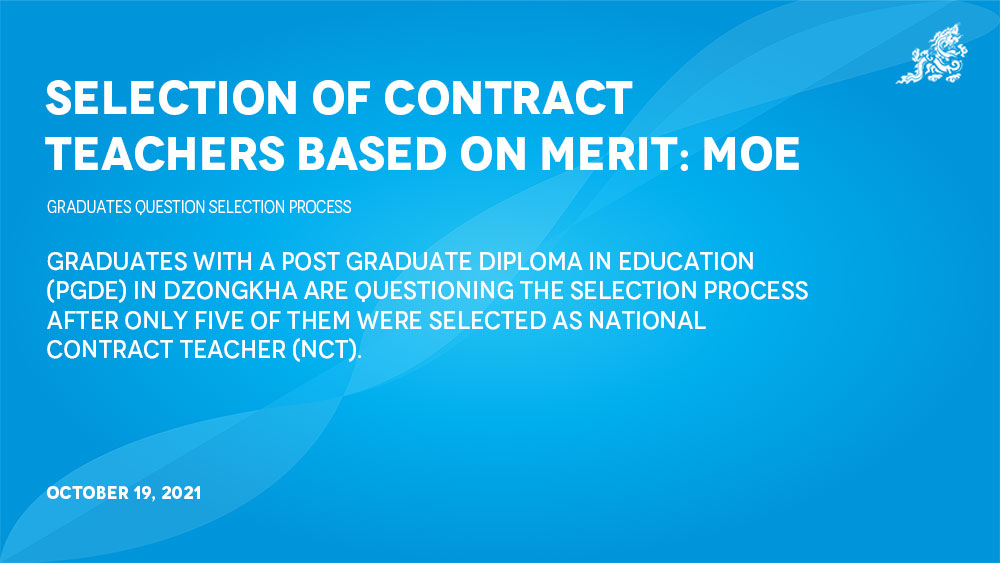Graduates question selection process
Chhimi Dema
Graduates with a Post Graduate Diploma in Education (PGDE) in Dzongkha are questioning the selection process after only five of them were selected as National Contract Teacher (NCT).
The ministry floated vacancies for 237 teachers on a consolidated contract. Out of that, 124 vacancies were for Dzongkha language teachers. Only five out of the 38 graduates with PGDE in Dzongkha were selected. The results were declared on October 8.
A graduate said that he approached the Ministry of Education (MoE) to crosscheck his scores, but he was denied access to the scores, on the grounds that the results were confidential.
The MoE’s Human Resource Division, he said, told them that selections were based on interviews, and no points were awarded for prior training and experience. “If the selection was based solely on the interview, then our training and experience have no value,” he said.
The MoE’s announcement issued on August 3, stated that candidates with B.Ed., PGDE and teaching experience will be given additional weight as appropriate.
Another graduate said: “It is not that we have to get the job, but we are unhappy because the selection process is unclear.”
The graduates said that some of their friends who applied for positions as substitute teachers were selected for NCT.
Some of the selected are also sitting the Bhutan Civil Service Examination (BCSE), they said. “If they get selected, they might leave the position they secured.”
A graduate said that for quality education, experienced teachers are better, but some of the graduates selected by the MoE do not have any experience. “This hampers the quality of education, and graduates who are interested miss out on an opportunity.”
Selection based on merit
The MoE’s chief human resource officer, Dhendup Tshering, said that selections are based on fairness, transparency, objectives, and principles of merit.
“In the process of open competitive selection wherein there are many aspiring and potential candidates, there is no assurance that only those candidates with PGDE will get selected,” he said.
The candidates, he said, must prove to the panel members that they are not only qualified, but also competent to become a teacher.
Dhendup Tshering said that the selection process by the ministry is the same as BCSC, except that a written test is not conducted.
During the selection, 10 panel members were formed to interview 686 shortlisted applicants. Each panel had five members consisting of teachers and education officials with a teaching background.
Dhendup Tshering said that for uniform assessment, those on the panel were briefed on the standard assessment format, containing marking criteria developed by the Royal Civil Service Commission.
The Bhutan Civil Service Rules and Regulations 2018, chapter seven, states that two extreme marks awarded to the candidate by the panel members shall be eliminated, and the average of the remaining shall determine the final marks.
“The two extreme scores awarded to the candidates were considered as outliers,” Dhendup Tshering said.
Candidates with a Bachelors of Education and PGDE and teaching experience were given preference while shortlisting, he said, but the selection was based entirely on the performance of candidates in the selection interview.
He said the assessment had marks for certificates of merit and individual achievements based on documentary evidence.
“If those candidates with PGDE are given the advantage for selection by default, the whole system of meritocracy is disrupted, and even more, there is a risk of complacency,” he said.
Five candidates were selected as substitute teachers and NCT.
The candidates were allowed to apply for substitute teacher and NCT positions simultaneously, Dhendup Tshering said, as consideration for the duration of the contract and also noting that there is no assurance whether they will be selected for NCT, as it is based on open competition.
The contract term for a substitute teacher is three months and 14 months for NCT.
Dhendup Tshering said that the graduates were informed that the final result containing the consolidated score would be shared with the graduates, but not the score sheet with details from individual panel members.


